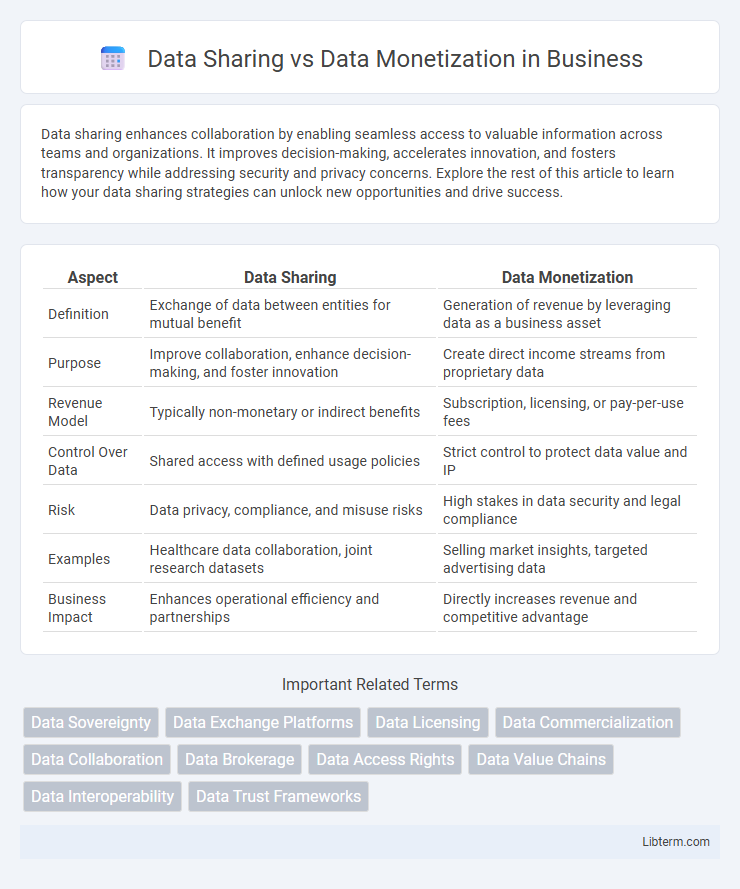Data sharing enhances collaboration by enabling seamless access to valuable information across teams and organizations. It improves decision-making, accelerates innovation, and fosters transparency while addressing security and privacy concerns. Explore the rest of this article to learn how your data sharing strategies can unlock new opportunities and drive success.
Table of Comparison
| Aspect | Data Sharing | Data Monetization |
|---|---|---|
| Definition | Exchange of data between entities for mutual benefit | Generation of revenue by leveraging data as a business asset |
| Purpose | Improve collaboration, enhance decision-making, and foster innovation | Create direct income streams from proprietary data |
| Revenue Model | Typically non-monetary or indirect benefits | Subscription, licensing, or pay-per-use fees |
| Control Over Data | Shared access with defined usage policies | Strict control to protect data value and IP |
| Risk | Data privacy, compliance, and misuse risks | High stakes in data security and legal compliance |
| Examples | Healthcare data collaboration, joint research datasets | Selling market insights, targeted advertising data |
| Business Impact | Enhances operational efficiency and partnerships | Directly increases revenue and competitive advantage |
Introduction to Data Sharing and Data Monetization
Data sharing involves the distribution and access of data between organizations or systems to enhance collaboration, innovation, and decision-making processes. Data monetization refers to the process of generating economic value from data assets, either by directly selling data or through data-driven products and services. Understanding the distinction between data sharing, which emphasizes accessibility and utility, and data monetization, which focuses on revenue generation, is essential for developing effective data strategies.
Defining Data Sharing: Concepts and Benefits
Data sharing involves the controlled exchange of data between organizations or systems to enhance decision-making, improve efficiency, and foster innovation. Key benefits include increased collaboration, access to richer datasets, and accelerated research and development by leveraging diverse data sources. Effective data sharing protocols ensure data privacy, security, and compliance with regulatory standards, enabling trust and maximizing value across stakeholders.
Understanding Data Monetization: Processes and Approaches
Data monetization involves transforming data into measurable economic value through processes such as data licensing, productizing insights, or enhancing business operations for revenue growth. Approaches include direct monetization by selling raw or processed data, indirect monetization by using data to improve customer experiences or operational efficiency, and platform-based models where data drives network effects and partnerships. Effective data monetization requires robust governance, compliance with privacy regulations, and leveraging advanced analytics to unlock actionable insights.
Key Differences Between Data Sharing and Data Monetization
Data sharing involves the exchange of data between organizations or entities to enhance collaboration, innovation, or operational efficiency without direct financial gain. Data monetization refers to the process of generating revenue by leveraging data assets, either through selling data, offering data-driven services, or creating new business models centered on data. The key differences lie in intent: data sharing prioritizes mutual benefits and partnerships, whereas data monetization focuses on commercializing data for profit.
Legal and Ethical Considerations in Data Practices
Data sharing and data monetization practices must align with stringent legal frameworks such as GDPR, CCPA, and HIPAA, ensuring consent, transparency, and data minimization principles are strictly followed. Ethical considerations include protecting user privacy, avoiding discriminatory data use, and maintaining data security to prevent breaches or misuse. Organizations balancing these practices must implement robust governance policies to uphold legal compliance and foster trust among stakeholders.
Business Models: Sharing Data vs. Selling Data
Data sharing business models emphasize collaborative use of datasets to enhance innovation, improve customer experiences, and create ecosystem value without direct revenue generation from the data itself. In contrast, data monetization models focus on selling data assets or insights to third parties, generating direct income streams by leveraging customer, operational, or transactional data. Companies choosing sharing models prioritize strategic partnerships and long-term value creation, while those opting for selling models capitalize on immediate financial returns and market demand for actionable information.
Impact on Consumer Privacy and Trust
Data sharing often raises concerns about consumer privacy due to potential unauthorized access and misuse of personal information, leading to decreased trust in organizations. Data monetization involves the strategic use of consumer data to generate revenue, which can compromise privacy if transparency and consent are not prioritized. Maintaining strong privacy safeguards and clear communication about data usage is essential to preserving consumer trust in both data sharing and monetization practices.
Technological Requirements for Secure Data Exchange
Secure data exchange requires advanced encryption protocols, such as AES-256 and TLS 1.3, to protect data confidentiality and integrity during transmission. Implementing blockchain technology and decentralized ledgers enhances transparency and traceability in data sharing, reducing risks of tampering and fraud. Robust access control mechanisms, including multi-factor authentication and role-based permissions, are essential to ensure only authorized entities participate in data monetization and sharing processes.
Industry Applications: Use Cases of Sharing vs. Monetizing Data
Data sharing enables industries like healthcare to enhance patient outcomes by combining datasets for comprehensive analysis, while data monetization allows sectors such as finance to generate revenue by selling insights derived from proprietary data. In manufacturing, data sharing improves supply chain efficiency through collaborative forecasting, whereas monetization transforms operational data into profitable products or services. Retail businesses benefit from data sharing via personalized marketing strategies across partners, contrasting with monetization models that leverage customer data to create targeted advertising platforms.
Future Trends in Data Sharing and Monetization
Future trends in data sharing emphasize enhanced interoperability through blockchain and AI-driven platforms that ensure secure, transparent exchanges while maintaining privacy compliance. Data monetization is evolving with the adoption of real-time analytics and edge computing, enabling businesses to extract immediate value from diverse data streams. Increasing regulatory scrutiny will drive innovations in consent management and data sovereignty, shaping more ethical and efficient data ecosystems.
Data Sharing Infographic

 libterm.com
libterm.com